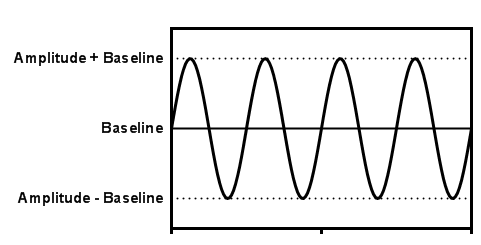Introduction
Sine waves describe many oscillating phenomena. Usually the sine wave oscillates around Y=0 (what we call the standard sine wave). This equation has the wave oscillating around a baseline value that does not have to be zero.
Step by step
Create an XY data table. There is one X column, and can be many Y columns. If you have several experimental conditions, place the first into column A, the second into column B, etc.
After entering data, click Analyze, choose nonlinear regression, choose the panel of equations for sine waves, and choose Sine wave with nonzero baseline.
If you know the Y value is at baseline at time zero, then constrain PhaseShift to a constant value of zero.
You may need to fuss with the initial values for PhaseShift and Wavelength, as our built-in rules for computing the initial value rarely work.
•For Wavelength. Count the number of peaks between two values X = a and X = b and set the initial value for Wavelength to 1/( NumberOfPeaks / (b - a)).
•For PhaseShift. If Y=Baseline at X=0, then PhaseShift is zero. If Y is at its maximum when X=0, then PhaseShift=3.14159. Interpolate in between if necessary.
Model
Y= Amplitude*sin((2*pi*X/Wavelength)+PhaseShift) + Baseline

Interpret the parameters
Amplitude is the height of top of the waves from the baseline, in Y units. If Prism reports a negative Amplitude but you expect a positive Amplitude, simply change the initial value of the PhaseShift by Pi in either direction.
Wavelength is the time it takes for a complete cycle, in units of X
Frequency is the number of cycles per time unit. It is calculated as the reciprocal of wavelength, and is expressed in the inverse of the time units of X.
PhaseShift in radians. A phase shift of 0 sets Y equal to Baseline at X=0. A PhaseShift of pi sets Y equal to its maximum when X=0.
Baseline is the Y value around which the curve oscillates, so is in the same units as Y.